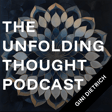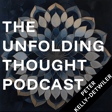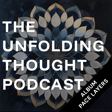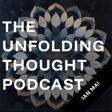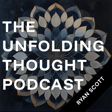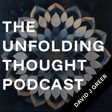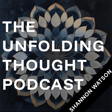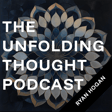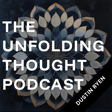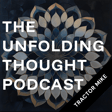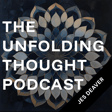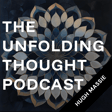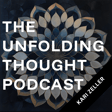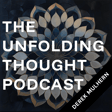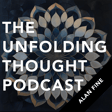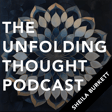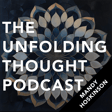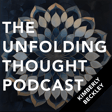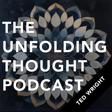Introduction to the Unfolding Thought Podcast
00:00:04
Speaker
Hi, I'm Eric Kratom. Welcome to the Unfolding Thought Podcast, the show for leaders and deep thinkers who demand more than the usual fluff.
00:00:16
Speaker
If you're the kind of person who moves on from a book, video, or podcast the moment it stops making you think or introducing you to something you can use, I hope you'll feel right at home here.
00:00:30
Speaker
In each episode, we uncover the deeper, often overlooked forces that shape our thoughts and behaviors. So you can see yourself, your team, and the world from a whole new angle, and then actually apply what you learn to grow and do better.
00:00:49
Speaker
On the Unfolding Thought Podcast, we aim for minimal filler and and maximal insight, challenging assumptions and sparking new thinking every step of the way.
00:01:01
Speaker
Are you ready to dive deeper? Then let's get started.
Journey from Musician to Marketer
00:01:07
Speaker
Today, I'm speaking with Jeremy Hazelwood, musician turned to marketer, author, and founder of Ampla Marketing. Jeremy's journey covers everything from being booed off stage at the Apollo to juggling multiple jobs while finishing school and then founding and running his own business, all in the pursuit of his passions.
00:01:30
Speaker
Today, he channels that same resilience he developed while giving his all for his dreams to guide nonprofits and businesses toward purposeful marketing.
00:01:42
Speaker
In our conversation, you'll hear how Jeremy's early years as a rap artist forged his creative hustle, how he developed the Edge framework to help people find their own unique strengths, and why someone has to own it is the key mantra for any team tackling new initiatives.
00:02:02
Speaker
Whether you're a brand builder, a nonprofit leader, or simply curious about how life transitions can fuel professional transformation, you'll find insight and a good dose of motivation here.
00:02:16
Speaker
And now I bring you Jeremy Hazelwood. Jeremy, thank you for joining me. You have been a musician. You've been boot off stage at the Apollo. You've had a top
Founding of Ampla Marketing
00:02:32
Speaker
100 hit, if I recall correctly. You're an author.
00:02:36
Speaker
You're a marketer. I'm sure there is a lot more to your background. Would you mind telling me a little bit about yourself? Sure. Also, thanks for having me on the show today.
00:02:47
Speaker
But yeah, everything, you you hit the high notes, the the Cliff Notes of the Cliff Notes version. But I'm Jeremy Hazelwood, live in Atlanta, originally from Oklahoma, and currently, and for a while, been the the CEO, owner of Ampli Marketing and Business Consulting, and my background is digital marketing.
00:03:06
Speaker
Got my start really as a teenager, just loving music, wanting to pursue a dream of seeing the world with music. And it was a friend of mine. We actually had a rap group.
00:03:18
Speaker
So we started rapping back in high school and was busing tables on the weekends to save money to actually pay for studio time. This is in the dark ages before any nine-year-old could make a beat and record a whole album at their house. she actually had to pay and go to a studio.
00:03:35
Speaker
um But, you know, for even from that point in time, it was just learning to do the same things I'm doing now, which is creating content, i.e. a song, and connecting it with an audience. It's the same exact thing. It's marketing.
00:03:50
Speaker
Once we had a product pressed up, which was cassettes, we were selling those out of our lockers at school, out of the trunks of our car, and just getting the word out. Performing where we could and ultimately moving to Atlanta.
00:04:03
Speaker
Working a corporate job while I was funding the the dream and finishing school up in Atlanta. Got my degree in marketing and minor in music industry. and really pursued music really hard in my 20s and got to a point where it was like,
00:04:18
Speaker
It's time to hang it up. you know Just seeing parts of the industry where I'm like, this isn't really what I signed up for. I just want to make music and have people appreciate the music. But you know you get into the business side of it and the politics. and just It wasn't really a fit for who I was as a person. So stayed within or trying to...
00:04:36
Speaker
Really trying to rediscover who I was, what I was good at, because I thought my whole, at least since my teenager, is was going to do music and have a record label or music production company. And then it was just time to make a shift. And I went through a few years trying to figure that out.
00:04:50
Speaker
On the other side of that, ended up working for some marketing agencies, went back to school, got my MBA, went through employment, went through unemployment, went through employment again and unemployment again. then was like, nah, man, we're going to start our own company because this is, I can have a little more control over my destiny in this route.
00:05:08
Speaker
So that's the that's the little longer version than yours, but not the longest version. Thank you. I appreciate that. So there are some things I think you maybe didn't mention, if I recall correctly.
00:05:23
Speaker
And one is you run your own business. You run a marketing agency, which I would love for you to describe because I don't even know if I described it appropriately there. And then you're also a podcaster.
00:05:37
Speaker
So can you hit on those two real quick? Sure,
Ampla Marketing's Services
00:05:41
Speaker
sure. yeah So with Ampli Marketing, it's a digital marketing consultancy serving being primarily nonprofits. It's not the only clients that I have. That's probably, depending on the year, maybe 60 to 70 percent of my by client makeup.
00:05:56
Speaker
and Outside of that, it's small and medium-sized businesses. I have a decent amount of food service clients But the services that I offer are just general digital marketing consulting, everything from like website strategy, website content, social media content, email strategy, campaign planning. Like if we're planning overall digital campaigns and we need to integrate different marketing channels, or if you need to integrate You're marketing with offline channels like direct mail or billboards or radio or something like that.
00:06:26
Speaker
And then also digital media. So Google ads, Facebook ads, LinkedIn ads, like in any social media ads, like you can just name the platform and it's like I can do ads on those.
00:06:37
Speaker
But it's really just helping, you know, from on the nonprofit side, it's really focused on fundraising. So making sure that we're optimizing and and making the best use of nonprofits budget so that we can generate more donors and revenue on the for-profit side. You know, those metrics can, it depends on what the client needs are. If they're trying to grow their email list or if they're trying to sell a food item at their restaurant. So it's understanding what those goals are and then building campaigns around it.
00:07:06
Speaker
On the podcast side, my show's called The Jeremy Hazelwood Show, because I'm like, what's a show that the name won't be taken? And no one has that name. So The Jeremy Hazelwood Show.
The Jeremy Hazelwood Show Podcast
00:07:17
Speaker
And right now, recording season two. and And also, congrats to you, Eric, for you jumping in this podcasting. Like, I know this is not an easy thing. So the fact that you're doing this, you have to edit it, record, schedule guests. It's a lot. So, you know, props to you, man, for what you're doing.
00:07:33
Speaker
But yeah, season one is done. as Season one is all about digital fundraising for nonprofits. Each season of mine is going to be on a different subject. So that's another way that, one, I'll differentiate my podcast, but also, too, so I won't be bored of just talking about the same thing over and over and over and over. You know, so season two will be more about personal development.
00:07:52
Speaker
and life transformation, which is more centered around my second book. And do you have, i believe, published two books. The first was on nonprofit digital fundraising,
Finding Your Edge Book
00:08:02
Speaker
correct? And then no one else is going to see this except you because this is just audio, but I'm holding the second book, Finding Your Edge, How to Unlock Your Talent and Purpose. And I think...
00:08:14
Speaker
You know, you just mentioned that the second season will be sort of focused around your second book, but it's been a while since I've read your book. It was a great book. So I hope that someone who listens to this will think to go look up Finding Your Edge by Jeremy Hazelwood. But is the second season of the podcast going to be focused around Edge, which was an acronym, if I recall correctly.
00:08:45
Speaker
Correct. Yeah. EDGE is eliminate distractions, discover yourself, generate goals, and enacts discipline. But it's really this whole model that I really...
00:08:56
Speaker
worked through is I was trying to figure out when I came to that pivotal point in my life where I was leaving the music behind and trying to figure out what to do next with life. And it's really a book for people in transition like that. For me, it was trying to figure out who I was, what my career will be, what I want to do.
00:09:12
Speaker
ah But it's also applicable for people who are changing jobs or moving to a new city or graduating like Or if you're in a job right now and you can do it with your eyes closed, you're not challenged and you're like, man, i I know I'm supposed to be doing something more with life. I'm just not sure what that is. Like, it's a good starting point for you to do that.
00:09:30
Speaker
So, yeah. So this model walks you through the process that that I went about. You know, it has some models that I've created along the way, um some questions. It's a lot of like, i don't know if soul searching is aware, but certainly like self-discovery and challenging yourself to really tap into who you've always been your whole life and really uncovering those gifts that exist within you.
00:09:50
Speaker
Okay. And so there's Edge. And am I recalling correctly that there's another one that came out of your first book? Is it Vostek?
The Vostek Model for Strategic Planning
00:10:01
Speaker
Yeah, Vostek. And I talk a little bit about that within the the goal the goals part of my book. Because it really is, it's like a goal, but also strategy model. And I trademarked that. and it's vision, objectives, strategy, tactics, execution, and KPIs.
00:10:21
Speaker
And we could do like a whole episode on that. But it's just basically what I find in me personally, and even just being in the business world and when businesses are trying to plan like their, whether it's a campaign or their annual plan, you know, the there's so many different approaches that people take. And you've been in these meetings, Eric, where nobody really knows where to start. There's 10 different people in the room with 10 different ideas of how it should go based on 10 different experiences. Some are great ideas. Some are just like not great ideas.
00:10:54
Speaker
ah So Vostek was really a way for me to encapsulate like what is a sound way to walk through a planning process. um And that's why i created that one. And I use that even now. I've used it with some Fortune 500 clients. There's a client right now, a really huge nonprofit that I'm working with, and I'm implementing the Vostek mode within their decision making and strategy planning.
00:11:18
Speaker
So it's really effective, whether you're like a small mom and pop store or a major corporation, but also if you're just setting goals for your life, it's not just for business. You know, it's like when you think of like visions, objectives, strategies, it's like, what is the vision for my life? You know, what are my objectives to achieve that vision and strategy? How am I going to do it?
00:11:39
Speaker
So it's applicable across so many different areas of our our life, whether business life or personal life. And right now in the work that you do, you're doing a combination of for-profit and nonprofit work.
00:11:55
Speaker
You have in your past, if I recall correctly, some bigger businesses. I think you just alluded to one, but you have worked with, cannot recall if it was Coca-Cola or AT&T or something like that. Then you've worked with some of the biggest on the nonprofit side of things, the Salvation Army and other groups. When you're thinking about planning, you know, so you're thinking about what's the vision or the objective or any number of other things, or when you're getting down closer to the execution level of things,
00:12:31
Speaker
Over time, have you seen similarities or differences amongst the mindsets of the people that you're working with or the challenges that they face and how you go about helping them address those things?
Challenges for Larger Companies
00:12:45
Speaker
Yeah, definitely. And what I find, and it really is, To be expected, it's really like the larger the company is, the more complex it is because of many reasons. One, there's so many more people that have a say. There's so many more stakeholders than just a smaller company.
00:13:05
Speaker
ah There's also a lot of different and tech challenges that you have to think through. You know, you may have a great idea like, hey, here's how we can do it. But to actually do that, you may not be able to with the technology stack that you're working with.
00:13:19
Speaker
It may be a great idea, but it's like we just can't do that with what we currently have. And to change a piece of your technology, A, may not be in the budget for this year or next year. ah And two, it just may not be something that even if it is in the budget, like who's going to do it? If we're talking about bringing a brand new tool in that nobody knows how to work,
00:13:40
Speaker
you know Now we're like, what I find is people put up with crappy technology because It's what they know how to use as opposed to just kind of like, let's just go through some really difficult, challenging months, figure out this new system. And yes, we're going to take a few steps back.
00:13:58
Speaker
But the way that you can spring forward from that is going to be way beyond and set you up better in the future than where you are right now. But most companies don't have the tolerance to do that. They don't have the appetite to go through it. They'd rather just deal with what we know. that It's what is like the devil that you know is kind of the approach.
00:14:16
Speaker
So that's one of the biggest challenges that I would say but when you're working with definite definitely different people, different technologies. So yeah, I'll leave it at that. And with your business Ampla, if I recall correctly, you emphasize in your messaging purposeful marketing, which I think shows up a bit in Vostec in particular, getting clear on what are we doing here, more or less.
00:14:43
Speaker
So it sounds like there are a lot of opportunities, regardless of for-profit or nonprofit, to lose sight of what are we actually doing here. And is it just Vostek, I suppose, that you fall back on to get clear on what's the purpose? Or how is it generally that you go about trying to bring clarity to your clients for what's the purpose of what we're all doing here, I guess?
Purposeful Marketing Principles
00:15:15
Speaker
I mean, first is to ask the questions. You know, im never come in assuming anything or telling people how to fix a problem that I don't even understand yet.
00:15:27
Speaker
you know And I think when you deal with consultants, and even agencies sometimes, there's this tendency to get a new client say, here's everything that we're going to fix for you. you know But you don't even really have a good handle on what the problem is.
00:15:40
Speaker
So usually the first, especially that first meeting, like I'm doing way more listening than I am offering solutions. because i can't It's like the classic you know going to the doctor and and The doctor comes in the room and they're you're telling the doctor to fix me. And the doctor's like, I don't even know what's wrong with you.
00:15:58
Speaker
You know, let's talk. Let me ask you questions. How do you feel? What part of your body is hurting? What's your diet been like? You know, so I need more information. And to me, the the purposeful piece, the the purposeful marketing is one, like you're saying, being very intentional,
00:16:13
Speaker
and purposeful in the approach, but also marketing for like a higher purpose. You know, like i and I have the luxury of only taking clients that I believe in, that like there's work that I've turned down because the values didn't align with who I am as an individual. So there's a purpose for me to take your brand or your cause and align it with my ethics and my character and do something bigger with it.
00:16:43
Speaker
ah But we're also going to do that on purpose. We're going to be intent about being very clear on your goals. I'm going to ask you, what are your goals? And based on the work that you do, Eric, you know this. You ask 10 clients and you ask them what their goals are.
00:16:57
Speaker
At least half of them are going to say, I'm not really sure. Like, that's why I hired you. And it's like, OK, cool. And they put the ball in your court, which is fantastic, you know, because you have this experience of working with other businesses. And so you can take all this experience you have.
00:17:13
Speaker
And so you're you're moving them forward in that respect. Now, if they do say, here's what I want to accomplish and here's our goals, that's also great because when they're clear on what they want to do, like you you can just be a part of that team. and In some respects, but like if you come up with the plan, then you have to bring them aboard and kind of sell them on your ideas and your plan.
00:17:31
Speaker
The other way, if they have the plan, you're just you jump in like a team member. They're Michael Jordan and you're like John Paxson. You're that that role player that's just coming in and hitting threes from from the outside when they need you.
00:17:44
Speaker
I think that is one way that really good consultants can differentiate themselves is figuring out how to bring out of people what it is that they're really looking for or what's important to them without making those clients feel like, hey, I'm paying you and you're just creating more work for me.
00:18:07
Speaker
Right, right. Yeah, and that's a a key in a sense. It's, A consultant is wearing also the hat of coaching. And always look at coaching as you're not telling people what to do. It's more your you're asking the questions. And you you may know the answers or at least the answer that you want them to arrive at.
00:18:26
Speaker
But you want to get the client more involved and ask them the questions because they have the answers. It's like it's their company, their organization. They know the history. They know their capabilities far more than any consultant ever will.
00:18:39
Speaker
So it's just asking the questions to have them discover that piece about themselves. and And I love when I ask the question, like, you why is always the great question? I know it's such a basic question, but why why do you do this? Or why are you using this?
00:18:54
Speaker
Why is your approach this? And it's all in the way that you ask it. You don't want to come off sounding like, you know, some jerk, like, well, why are you doing this? But it's, like, really a non-threatening, like, let's understand and let's talk about it out loud because sometimes you ask that why question and people in the room look at each other and they don't know why. They're like, why, yeah, why is that, Jeremy? Or why why is that?
00:19:18
Speaker
And people like, that's, Carl that had the job before me, like that's how he always did it. But nobody knows why Carl did it that way. um So it's like, OK, that might actually be an opportunity for us to dig into that and understand if that's the right approach that we should be taking. And maybe it is, but maybe it's not. So let's unpack that a little bit and let's look for those opportunities.
00:19:40
Speaker
And if people can't tell us why. Even if they say, here's why we do it, that's great. That's information. That doesn't mean that that's what you should continue to do. Because I'm fully of the mindset of the old, what got you here won't get you where you're going. you know These are tools and approaches that you use to elevate you and get you to this point of success or failure wherever you're at right now.
00:20:02
Speaker
But I'm always open to like, let's reevaluate. What what did we like? What worked about this approach? What do we need to do more of and what didn't work and what can we do less of? And is there something not in those realms that we can try to add on to this to make whatever the the goal setting or the strategy even better?
00:20:20
Speaker
You know, often, even if people do get clear on why they're doing something or what their objectives or their goals are, they can end up sabotaging whatever the new initiative is.
00:20:37
Speaker
And they may have competing commitments. There may be deeper fears or some sort of hidden constraints. In the work that you do, do you generally get involved with dealing with what's getting in the way of us accomplishing these things that you say you want to accomplish?
00:21:01
Speaker
Sometimes. There's a client that I'm working with now, and and I absolutely will not name names, but there's a lot of bureaucracy with this particular client. And it's one of these things where there's some initiatives that they have, and they have multifunctional teams, but yet these initiatives, it's it's nobody's main responsibility.
00:21:22
Speaker
So nothing is getting done on It's like, here are the things that we want to do, but these different departments are working towards their own goals. And yes, we all agree that this is our initiative, but there's not a single department who owns it.
00:21:35
Speaker
And it blows my mind that larger companies function this way. And you would think they don't. You think larger companies have it all figured out. um But once you start working there, you're like, wow, there's a lot of problems. But there's a lot of things they do great, a lot of great processes and things like that.
00:21:49
Speaker
But when you look at initiatives, and this is what you can get into, especially with larger companies, if you've run a certain way so long, and especially in this digital age, the AI age, it's like, who owns AI?
00:22:01
Speaker
Is it marketing? Is it technology? Is it sales? Is it communications? And ah everybody owns a piece of it, but nobody owns it. So that's the piece where, you know, I come in and I try to present this as a problem.
00:22:15
Speaker
If it's not anybody's responsibility, then nothing, there's going to be no progress made towards it. So how can we call this out as something very important? You said that this was an initiative. So if this is really an initiative and it's that important,
00:22:28
Speaker
It needs to have an owner, like one owner, and you can have other people that contribute to it using like the RACI model, for example. And I forget what all that stands for, but I know it you know is involved with roles and who needs to be informed and all that stuff.
00:22:43
Speaker
um But there needs to be ownership. So my role with this is let's push it into a team. And nobody wants to take it, you know, because everybody's overworked with the work that they already have. It's like they want to contribute to it, but nobody wants to own it.
00:22:56
Speaker
Because, oh, that's more work on us. But it's like, man, someone has to own it. And now does that mean we need to hire somebody else to bring in? So it opens up a lot of questions. It's uncomfortable. But ultimately, it really helps put that pressure on, a is this initiative something that we really believe in, that we're really going to go after?
00:23:14
Speaker
We're not just going to do it halfway. If we're going to do it halfway, let's not do it at all. It's not our competency. So let's just set it on the table, pick it back up next year and see if we're going to be serious about it. If we are going to be serious about it,
00:23:26
Speaker
Let's put the time and resources into making it so that these are some of the decisions that I attempt to help business leaders make. You know, when you get the chance to work with organizations that are trying to do something new or you've come in and you're being asked to provide clarity where things are currently unclear, maybe some certain processes don't work or there's the change in technology or whatever else that likely has created a lot of stress for the people that were involved even before you got involved.
00:24:04
Speaker
If you're going through some type of change, if you're leading them through some change, there might very well be continued or even increased stress or anxiety.
00:24:17
Speaker
Now, I think I recall from your book, Finding Your Edge, or maybe I've encountered it with you in other places that you do have a desire to coach people or to include in your work and appreciation for self-care and for people to be able to have their mental life, their careers to whatever it is that they're doing to have some sustainability on the human side of things.
00:24:52
Speaker
So in potentially high pressure situations, do you introduce much of that kind of coaching or consulting that maybe is on the level of coach or individual?
Self-Care in Business
00:25:07
Speaker
your projects? Or is that kind of coaching and consulting sort of a separate offering? Yeah, i I would like to work it into more business clients of mine.
00:25:18
Speaker
However, like it, that's a hard, it's been a hard selling for me. It may not be for other people, but typically people are hiring me for marketing and consulting and that's the budget item. You know, when we start to bring in coaching, that's usually a different line item and a different Yeah, it's not necessarily what they know me for because their experience is marketing. But when they see maybe some my content online and and read my books like, oh, he actually can do this as well. So I tend to do the coaching more on a personal level right now. You know, the goal is that maybe when we listen to this podcast three, five years from now, i' like, I remember when I was thought on the podcast and and we were saying this is what I wanted to do.
00:25:58
Speaker
But now here here i am. But for the time being, this timestamp right here, yeah, it's really just more from a personal standpoint. But it is like it's the the personal, the self-care, we'll call it that, that you have to take.
00:26:13
Speaker
And I wish it was worked in more to the business world. And I think there has been some attention on it in the past, you know. three to five years or so. But from a personal note, yeah, you, you leave your office, you come home, you're stressed.
00:26:27
Speaker
Maybe you have other goals, you have other deadlines, you have a family you're coming home to. So how are you taking care of yourself? Because at the the bottom line is, if you are not taking care of yourself, you can't be the best output that you can be for your job. You can't be the best spouse that you can be for your partner. You can't be the best parent that you can be.
00:26:46
Speaker
And you can't even be the best for yourself. Like your physical and mental health can decline, which makes you you're not feeling as good. you're You're not sleeping as well, causing brain fog and depression, all kinds of things. So you have to prioritize your your life, your health where within corporations, especially like you and I both come from the agency world and agency culture in general.
00:27:11
Speaker
has been to really overwork and maximize what they can get out of people. And I'll say that not every agency is like that. There are some agencies that really do talk the talk, walk the walk, and they're like, hey, we care about our people and we don't want to burn our people out.
00:27:26
Speaker
um And I appreciate that. And I think there has to be more of a cultural awareness and responsibility, not just for agencies, but for businesses, period, to take care of your people. You know, like I have a person that works for me, like I'm a small company, it's me and one person that works for me. But it's like, to me, I need her to be straight. If she's not, if there's, if she needs to take off for health reason or whatever, like take off, like, I just need you to be good.
00:27:51
Speaker
So you can give me your best work. And let's have those honest and open conversations. Because bottom line, if you're not in a good space, my company is not going to be in good space. So yeah. Take the time.
00:28:02
Speaker
Having had some background in the music industry, i imagine that, well, especially coupling that with the fact that most people, whether they have big time success, small time success, they have no success, whatever it is, most people that give it a go are fairly young.
00:28:24
Speaker
So whether you're in your teens or your twenties, there are still things in life that you're figuring out. There's some wisdom still to be picked up. So taking account of, or sorry, keeping in mind that you spent some time in the music industry, following a passion and doing things that are very difficult.
00:28:46
Speaker
And you have been and entrepreneur as well, which can come with a certain level of risk and uncertainty. I'm curious what you've learned through your journey about I don't know, moderating how much time you're putting into things or how much you're thinking about things that maybe aren't always useful.
00:29:12
Speaker
And even perhaps what your experience was when you were younger and you were going through music and there was a lot of uncertainty, how did you deal with things and what did you learn along the way that maybe you would like people to know now and they can save themselves from some of that pain.
00:29:30
Speaker
Yeah. Yeah. It's very interesting, like looking back at where I was, especially when I moved to Atlanta and how I was living my life versus how I'm living it now.
00:29:43
Speaker
Because back then it was... the hunger was like top level. Like I was kind of like, I moved from Oklahoma from everything I knew from my family, everything to follow this dream. So in a sense doing that and even starting my business, there's some degree of risk aversion that I have, you know, it's kind of this high risk, high reward.
00:30:03
Speaker
But over time, I certainly, I've, I've tethered that because when I was 20 years old and moved to a new city, Like I'm 20. I have no responsibilities except myself, you know, and I needed to pay rent and things like that.
00:30:19
Speaker
So I did work a job for as long as I could. And but back then, man, it was I was such a hustle because I was working 40 hours a week.
00:30:32
Speaker
I was finishing up school and I was taking a full load. So between depending on the semester, between 14 and 18 hours ah while I'm going to school full time. And then I also worked at the school radio station.
00:30:46
Speaker
And then i also was doing music on the side. So my life, like looking back at how I did that was is insane. I slept like four hours each night consistently because every there were zero days off. And I don't know people say that, like, oh, no days off. But like literally, it was zero days off for about three or four years because I had my work schedule such that it kind of worked around my school schedule. So I worked almost every weekend, went to school Monday through Friday, you know, worked at the radio station in the evening.
00:31:21
Speaker
And then I'm at home when I'm done with homework. Like making beats, recording in my studio, going out to perform in the Atlanta area. So like it was the hustle, but it was exciting for me.
00:31:33
Speaker
And I was never tired. Like you get into that mode and you're just like, this is just what it is. Like four hours, it didn't seem like I never felt like I lacked sleep. I didn't wake up groggy. I just like, it's time to go. It's the lifestyle, you know?
00:31:46
Speaker
That is not sustainable. You know, for me, I didn't. It was sustainable for me at the time, but I can't. You can't do that for like 10, 20 years. Like you shouldn't do that. That's terrible for your body.
00:31:57
Speaker
But get to a point where have a son and walk away from music, have a ah girlfriend who became my wife. We have three kids between us. Priority shift.
00:32:08
Speaker
And at the time with music, it was like, all I wanted to do was music. So 100% of any ounce of time I had went into that. Now it's like, man, I love my family. I love, I love working, but also i like the balance. I don't want to work, you know, as hard and as long as I did before. It doesn't mean I don't still have a drive in me, but if I could go back and tell people,
00:32:30
Speaker
going through it This is probably terrible advice, but it's like go hard while you can, you know, in your early twenty s if you have the ability to do it, but take care of yourself. If you notice that your body feels off, your mind feels off, then you're probably going a little too hard and you need to pump the brakes a little bit.
00:32:47
Speaker
Finding the things that are most important to you and making sure that you are being able to show up for those things and be the best person that you can, like that's always been most important for me.
00:32:59
Speaker
So, you know, through life as, you know, I've lost jobs, which sucked. And to your point, it's like, yeah, I started a company which seemed risky, but going through this cycle of working for multiple marketing agencies, they hire people when they get clients, they shed head count when they lose clients.
00:33:18
Speaker
Going through a few cycles of that, it didn't seem like such a crazy idea to start my own business because I'm like, there's probably more stability here. And It's proven to be that way for me. It doesn't mean that'd be the case for everybody. I feel very blessed in that respect.
00:33:31
Speaker
I don't recall if we've talked about this before, but at least at the moment, I didn't realize how similar some of our experience was. So when I was doing my MBA, I recall at at least one point I had four different jobs that I worked a minimum of a total of 40 hours a week, sometimes more.
00:33:55
Speaker
Plus I went to school, plus at least for the, you know, medium sized town that I was in the band that I led was quite popular.
00:34:07
Speaker
Now, of course, you're not popular enough that when we went to the next town over, anybody would show up at a show, but that's quite common. And I had very few attachments or commitments other than I just needed to finish my MBA. I was attached to you my band. And then, of course, I had commitments in those jobs.
00:34:29
Speaker
But I didn't realize that we had those similarities. And of course, i don't recall if it was stated before. But for anyone listening, Jeremy and i have worked together before as members of an agency. And, you know, i probably don't need to say it, but Jeremy is easily one of the smartest marketers I have ever worked with.
00:34:53
Speaker
Say the same about you, man. Thank you. Thank you. I appreciate that. Well, I want to make sure to get to it, even if in brief, before we wrap up, you mentioned AI at one point.
00:35:05
Speaker
You run a small business. There's a lot of uncertainty around AI at the moment.
AI's Impact on Marketing and Workforce
00:35:13
Speaker
And there has been uncertainty throughout our careers in marketing, whether you're talking about something that should have been simple, but to me felt really dumb, like the change over from Google Analytics, Universal Analytics to g a four or early days in social media before there was a lot of opportunity to advertise, but you had big businesses that were involved in it. and so then everybody else wanted to know.
00:35:42
Speaker
What am I supposed to be doing here? There have been lots of times when there was uncertainty. It feels like to me with artificial intelligence that it's not just a marketing thing or just an IT team thing.
00:35:58
Speaker
It feels like there really is a step change that's going on in a lot of different spaces of life or work. So you know, what I'm what I'm getting around to is what are you experiencing or how would you want people that hear this to think about the things that are changing in marketing?
00:36:25
Speaker
And then, you know, as a result, might they want to go and look up a certain type of information or talk to you?
00:36:36
Speaker
Because as I said, I think There is a lot that's changing. It's not just that things are changing and it's uncertain. I think we have a way in which we are going to be able to do work that is different as a result of this.
00:36:50
Speaker
No, agree with that. And in my world, like I'm so focused on AI's use with marketing that I often don't even think about the ways that AI is going to be used outside of my marketing world.
00:37:05
Speaker
you know, just in terms of banking and finance and supply chain and all these other areas. You know, I think back to maybe five to seven years ago when the the big word was like digital transformation, you know, and all these manufacturing and banking and healthcare care were going through digital transformation and big data and all this stuff. and And quite honestly, a lot of that also used AI. It just wasn't really, AI wasn't as commonly used back then.
00:37:35
Speaker
the models, the AI models have gotten so much smarter and more, the bar has been lowered where people like you and me can access it for free. Whereas maybe five to seven years ago, you had to spend a lot of money to access those models.
00:37:50
Speaker
So the when you have a bar of access that's significantly lower, it's really interesting. You're like, you're basically putting it into the world's hands. Whereas before that power and use of AI was held for people that had access and resources.
00:38:06
Speaker
So I think it's, and we've already seen how people are using AI that maybe the big companies didn't think about. From a marketing perspective, I've had, gosh, many conversations about AI and marketing, especially here in Atlanta.
00:38:18
Speaker
I connect with a few marketing groups here locally. And of course, it's a hot topic. Some people are worried about their jobs, especially like copywriters. And one thing that we keep coming back to is there still has to be somebody to run the AI.
00:38:33
Speaker
They don't have robots to run the robots yet. You know, so when I look at there's a seasoned marketer and there's a brand new marketer, I think a seasoned marketer has the luxury of experience and knowing what works in marketing and messaging, what doesn't work in marketing or messaging.
00:38:50
Speaker
And they can use that to create really good prompts for copywriting or, you know, creative, whatever the case may be, or even campaign planning, social media copy because they have that experience.
00:39:03
Speaker
That doesn't mean that a new marketer is going to be out of a job because they don't know how to do that. The new marketers, in my opinion, have a really good opportunity because this is like, if you think of college students and people just getting out of college, like this is really like the first generation entering the workforce that AI has been a part of them. They've learned it early, just like people many years ago learned digital marketing because they were younger and they understood it. They had the time to develop that knowledge and research, whereas older people in the workforce didn't have the time. They were always stuck on other forms of marketing. so
00:39:38
Speaker
For a younger marketer, it's like get in there, learn the tools and be a ah help to guide senior marketers with how you can use AI and bring that that tools that and work with the older marketers to understand the history of what works and what doesn't work.
00:39:56
Speaker
So I don't, yes, ah people will lose jobs, but it's also going to create jobs. But I think at the end of the day, there the main thing that cannot be duplicated is like the human element.
00:40:07
Speaker
So the more real that you can be and inject humanism into the stories, into the marketing and messaging, the more value that you can bring. Like I i use AI several times a week with my clients, but the way that I'm doing it is like, and you, you should, I know you know this, Eric, but you, the listener should know this. And if you don't, I'm just going to say it.
00:40:29
Speaker
AI is not a set it and forget it. Like whatever chat GPT spits out, it's not copy, paste, publish. It's like, copy paste analyze evaluate the tone the messaging the wording inject the brand name.
00:40:45
Speaker
You can create GPTs of your own within like Chad GPT, for example, where you can have all this already built in. It takes some time to build that up for it to learn your tone and everything. But even then, you still want to critique your own work and challenge yourself. Like, how can i make this even better?
00:41:03
Speaker
So to me, AI is a tool, just like a computer is a tool. I often think about like calculators Made learning math easy. You just type something in and it gives you the answer. It's almost like a tool like ChatGQT. It's almost like the life calculator. You just type in whatever and it spits out the answer.
00:41:22
Speaker
But unlike a calculator, you can challenge what the answer is because some of it is subjective. but But understanding the best way to use it for you and for your brand. Don't be scared of it. Embrace it. Enhance it. It's not going anywhere.
00:41:35
Speaker
So just get in the tools, work with them, play a around with them. Yeah, i totally agree with you. And I know we're on a schedule today, so want to make sure to not keep you too long.
00:41:48
Speaker
We can most definitely, as I think you and i know, go on for a long time. so Anyone that's listening to this, you know, i do want to promote your books. I'll link to those. I'll link to your website and anything else that is appropriate that we have mentioned that will all be in the show notes. But for somebody who's listening to this, is there anything you want to leave them with?
00:42:13
Speaker
And also, where can people find you, follow you, connect with you? Yeah, I think I would leave people with just taking some kind of action.
00:42:25
Speaker
And I've been thinking about this a lot lately, whether this is related to marketing or just life in general, you know, because I think it's so relevant to everybody's life. There's a lot going on. In the country right now, I'm not going get into politics. It doesn't matter what side of politics you're on. There's a lot of change that we're experiencing across the globe right now.
00:42:43
Speaker
You may be experiencing some things within your life that are personal to you, some decisions that you have to make. So like what I want to leave you with is just have the courage and the hope to don't to to to make a choice, to take an action, write something down today, like even after this podcast. like What is something that you can do today? Something that's bothering you? Something that's been like nagging at you? like I know I need to do this. and just like take just a small action today and start that that journey forward with whatever it is that that you need to overcome or work towards so that's what I would leave them with ah to connect with me you can go to my website jeremyhazelwood.com which is h-a-s-e-l-w-o-o-d also ah instagram jeremy.hazelwood or linkedin like you want to connect on some business jeremy hazelwood so reach out to me there
00:43:29
Speaker
Thank you, Jeremy. i appreciate that. And I hope that everyone got a lot of value out of this. i appreciate you giving me the time and hopefully we will speak again soon.
00:43:42
Speaker
Cool. Thanks, Eric. Thank you. Hey, thank you for listening. I hope you got a lot out of today's conversation. and If you enjoyed the episode, please take a moment to rate, review, and subscribe.
00:43:53
Speaker
And please share it with someone you know who'd appreciate this kind of information. If you want to bring this kind of thinking to your own business, please check out mine at inboundandagile.com.
00:44:05
Speaker
We specialize in helping leaders with challenges around marketing, communications, and leadership, so they can inspire real action in their people and audiences. Thanks again for listening, and I hope you'll come back for future episodes.

